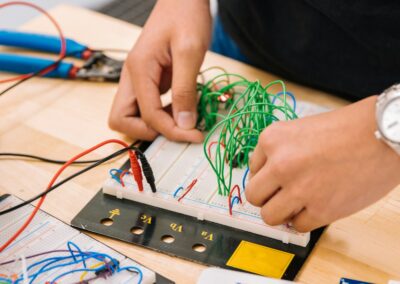The Impact of Social Features on Learning in the Metaverse
Enhancing Student Interaction and Engagement
The integration of social features in metaverse learning platforms is revolutionizing the educational landscape, enabling students to interact and build relationships in virtual environments. These features foster a sense of community and belonging, which is crucial for effective learning. In traditional education settings, social interaction plays a significant role in student engagement and motivation. Similarly, in the metaverse, social features such as virtual classrooms, discussion forums, and group projects create an interactive learning environment that encourages active participation.
In regions like Saudi Arabia and the UAE, where there is a strong emphasis on digital transformation in education, the adoption of metaverse learning platforms is gaining momentum. Cities like Riyadh and Dubai are at the forefront of implementing these advanced technologies to enhance the educational experience. By incorporating social features into metaverse learning platforms, educators can provide students with opportunities to collaborate, share ideas, and develop critical thinking skills.
Moreover, social features in the metaverse enable students to form study groups, engage in peer-to-peer learning, and participate in extracurricular activities, all within a virtual space. This not only improves academic performance but also helps students develop social and emotional skills that are essential for success in the modern world. The sense of community and belonging fostered by these interactions enhances overall student well-being and satisfaction with their learning experience.
Creating Inclusive and Diverse Learning Environments
The metaverse offers a unique opportunity to create inclusive and diverse learning environments where students from different backgrounds can come together and learn. Social features in metaverse learning platforms allow educators to design and implement inclusive teaching strategies that cater to the needs of all students. This is particularly important in regions like the UAE and Saudi Arabia, where diversity and inclusion are key components of the national education agenda.
By leveraging the power of the metaverse, educators can create virtual classrooms that are accessible to students with disabilities, provide language support for non-native speakers, and design culturally responsive curricula. Social features such as real-time translation, closed captioning, and customizable avatars help create an inclusive learning environment where all students feel valued and supported.
Furthermore, the metaverse allows for the integration of global perspectives into the curriculum, enabling students to interact with peers from different countries and cultures. This exposure to diverse viewpoints fosters empathy, cultural awareness, and global citizenship, preparing students for success in an interconnected world. The social features of the metaverse thus play a critical role in promoting diversity and inclusion in education.
Supporting Collaborative Learning and Teamwork
One of the most significant benefits of social features in metaverse learning is their ability to support collaborative learning and teamwork. In the metaverse, students can work together on projects, participate in group discussions, and engage in interactive simulations that mimic real-world scenarios. This collaborative approach to learning helps students develop essential skills such as communication, problem-solving, and teamwork.
In Saudi Arabia and the UAE, where there is a strong focus on preparing students for the future workforce, the emphasis on collaborative learning in the metaverse is particularly relevant. By working together in virtual environments, students can gain hands-on experience and develop practical skills that are highly valued by employers. The metaverse also allows for the seamless integration of industry experts and mentors into the learning process, providing students with valuable insights and guidance.
Moreover, social features in the metaverse facilitate the creation of learning communities where students can share resources, exchange ideas, and provide mutual support. These communities foster a sense of belonging and accountability, motivating students to stay engaged and committed to their learning goals. The collaborative nature of metaverse learning thus enhances the overall educational experience and prepares students for success in the modern workforce.
Implementing Social Features in Metaverse Learning Platforms
Designing User-Friendly and Engaging Interfaces
To maximize the benefits of social features in metaverse learning, it is essential to design user-friendly and engaging interfaces. The success of metaverse learning platforms depends on their ability to provide an intuitive and seamless user experience. Educators and developers must work together to create interfaces that are easy to navigate, visually appealing, and conducive to social interaction.
In regions like Riyadh and Dubai, where there is a strong emphasis on innovation and technology, the development of advanced metaverse learning platforms is a top priority. By leveraging cutting-edge technologies such as AI and generative AI, developers can create personalized and adaptive learning experiences that cater to the needs of individual students. These technologies can also be used to provide real-time feedback and support, enhancing the overall learning experience.
Furthermore, the integration of gamification elements into metaverse learning platforms can make the learning process more engaging and enjoyable. Features such as virtual rewards, leaderboards, and interactive challenges can motivate students to participate actively and achieve their learning goals. By creating a dynamic and interactive learning environment, educators can foster a sense of community and belonging among students.
Ensuring Security and Privacy in the Metaverse
As metaverse learning platforms become more prevalent, ensuring the security and privacy of students is paramount. The virtual nature of the metaverse presents unique challenges related to data protection and cybersecurity. Educators and developers must implement robust security measures to protect students’ personal information and ensure a safe learning environment.
In the UAE and Saudi Arabia, where data privacy is a top priority, the development of secure metaverse learning platforms is crucial. By leveraging blockchain technology, developers can create decentralized and secure systems that protect students’ data and ensure transparency in the learning process. Additionally, implementing strict access controls and authentication mechanisms can prevent unauthorized access and safeguard students’ privacy.
Moreover, educators must educate students about online safety and responsible digital behavior. By promoting awareness and providing guidance on how to protect their personal information, educators can empower students to navigate the metaverse safely and confidently. Ensuring security and privacy in metaverse learning platforms is essential for building trust and fostering a positive learning experience.
Future Prospects of Social Features in Metaverse Learning
The future of metaverse learning is bright, with social features playing a central role in shaping the educational landscape. As technology continues to evolve, the potential for creating more immersive and interactive learning experiences is limitless. The integration of AI, blockchain, and other advanced technologies will further enhance the capabilities of metaverse learning platforms, providing students with personalized, secure, and engaging educational experiences.
In Saudi Arabia and the UAE, the commitment to digital transformation and innovation in education is driving significant progress. By embracing metaverse learning and integrating social features, these regions can set a global standard for excellence in education. The collaboration between government, industry, and educational institutions will be key to realizing this vision and ensuring that all students have access to high-quality, inclusive, and effective learning experiences.
In conclusion, the integration of social features in metaverse learning platforms is transforming education by creating a sense of community and belonging among students. By fostering interaction, collaboration, and inclusivity, these features enhance the overall learning experience and prepare students for success in an interconnected world. The future of metaverse learning holds immense potential, promising to revolutionize the way we learn and interact in the digital age.
#MetaverseLearning #SocialFeatures #VirtualLearning #AIinEducation #BlockchaininLearning #UAE #SaudiArabia #Riyadh #Dubai #BusinessSuccess #LeadershipSkills #ProjectManagement























